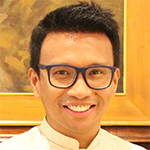 Religious education is in a conundrum. While teachers might take it seriously, students most of the time have a different opinion.
Religious education is in a conundrum. While teachers might take it seriously, students most of the time have a different opinion.
Part of the problem has to do with emphasis. Relative to mathematics, science, and other main subjects, religious education does not enjoy significant amount of time and weight in the basic curriculum. The weak emphasis gives the impression that it is not important, even if offered by sectarian schools. If one thinks about it, even Values Education might suffer from the same problem.
To complicate the picture, religious education, often offered as Christian Living and the like, typically adopts a pedagogical model that still relies on simply "knowing" doctrine, morals, and worship. The implicit expectation is for students to accept religious ideas as cold facts.
What is the problem for religious education these days? That it is boring does not even begin to unravel the real issue.
Defending the faith
This point became clear to me during the midyear conference of the Philippine Association of Catholic Religious Education (PACRE) last September. Hosted by the University of Negros Occidental-Recoletos, the event gathered Catholic teachers from different parts of the region.
During my talk, fellow teachers eagerly shared their concerns about young people today. Particularly revealing was when they shared their anxieties about teaching the "timeless truths" of the Christian faith. To some of them the task of defending religion is more indispensable these days. They want to address the problem of moral relativism which, based on their observation, has become the preferred worldview.

The anxieties are understandable given their conviction that religious education has the ultimate calling of transmitting the faith. When he addressed Catholic educators in the US, John Paul II declared that the work of religious education "includes transmitting clearly and in full the message of salvation, which elicits the response of faith."
Hence, without intending it, religious education could become more preoccupied with religious truth than with the actual issues of its intended audience – the youth. The problem it engenders is this: truth proclamations might fall on deaf ears if students do not recognize their relevance to the world they inhabit.
It is not surprising therefore that for some, religious education has failed to redeem religion.
This is how the militancy of religious education can backfire.
Daily realities
I am not a religious educator but the sociologist that I am recognizes the situation of young people these days. Some of them carry on with the faith, while others have simply lapsed into nominalism. Regardless, many young people are asking difficult questions about the religion into which they were born.
The questions are endless. Some are already familiar.
Isn't truth just a matter of choice? Isn't God beyond religion? What then do we make of other religious groups?
Is religion really necessary for a person to be good? And how can I trust religious leaders when they don't live out their faith in the first place?
Admittedly, quick-fix answers may not be available. But religious educators should not be afraid.
At the very least, religious education can be a safe space where these questions may be discussed freely and thoroughly. This means that students must not feel that they are judged for expressing their disagreement or doubt.
For theologians Rito Baring and Rebecca Cacho, "the classical way of teaching the faith through catechism requires a shift to adult education where people are able to think critically and decide more wisely for themselves on issues affecting their lives. Instead of servile obedience, personal commitment to the faith may be strengthened or sustained among the youth."
In other words, young people are not simply born into a belief system. Religion is no longer an ascribed identity. It is not a given.
It is instead an achievement. Young people need to be convinced about truth, faith, morality, and commitment.
All of these are big words, but not necessarily impossible. – Rappler.com
Jayeel Cornelio, PhD is one of the 2017 Outstanding Young Scientists of the Philippines. He is the author of Being Catholic in the Contemporary Philippines: Young People Reinterpreting Religion (Routledge, 2016). With Manuel Sapitula and Mark Calano, he wrote the Senior High School worktext Introduction to World Religions and Belief Systems (published by Rex). You can find him on Twitter @jayeel_cornelio.